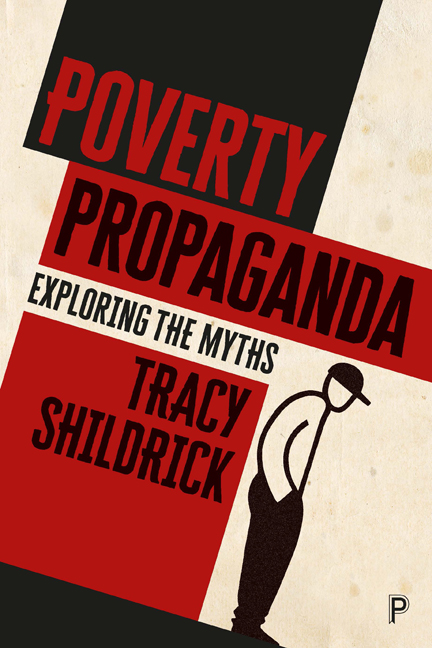Book contents
- Frontmatter
- Contents
- List of abbreviations
- Acknowledgements
- One Introduction
- Two Poverty propaganda
- Three Poverty and lived experiences
- Four Poverty, labour markets and ‘poor work’
- Five Poverty, social class and social immobility
- six Poverty: discrimination, stigma and shame
- Seven Poverty propaganda and reproduction of poverty, power and inequality
- Eight Conclusions
- References
- Index
Four - Poverty, labour markets and ‘poor work’
Published online by Cambridge University Press: 09 April 2022
- Frontmatter
- Contents
- List of abbreviations
- Acknowledgements
- One Introduction
- Two Poverty propaganda
- Three Poverty and lived experiences
- Four Poverty, labour markets and ‘poor work’
- Five Poverty, social class and social immobility
- six Poverty: discrimination, stigma and shame
- Seven Poverty propaganda and reproduction of poverty, power and inequality
- Eight Conclusions
- References
- Index
Summary
Introduction
Over the last forty years, rising numbers of the workforce have been denied access to secure, decently paid work with reasonable prospects. A sizeable proportion of jobs available today are part-time, poorly paid, temporary and offer very limited opportunities for further progress. (Lansley and Mack, 2015, p 95)
“Everybody needs to understand that you need to work for a living. You can't just expect everything for free, simple as that. It's important to work, without a doubt. Doesn't matter what it is. Cleaning **** out of the toilets, as long as I’m earning money for my family, I’d do it.” (Kieran, aged 20, claiming JSA, Teesside interviewee in Shildrick et al, 2012b)
“It was just the accepted thing. You went out to work … My ambitions sort of faded because I was working in a factory. I didn't have much time for ambitions. I was working too hard.” (Patrick, aged 49, Teesside interviewee in Shildrick et al, 2012b)
Paid employment holds a special place in poverty propaganda and it also has an important place in properly understanding the causes of poverty in the current social and economic context. Much poverty propaganda rests on the supposed distinction between those who are willing to work for their livelihoods and those who are purported to prefer to remain on out-of-work benefits. When George Osborne (Chancellor of the Exchequer 2010–16) asked, ‘where is the fairness for the shift-worker leaving home in the dark hours of the early morning who looks up at the closed blinds of the next door neighbour sleeping off a life on benefits?’ (Osborne, 2012), he was working to both create and perpetuate poverty propaganda, in a deliberate misrepresentation of reality. In British politics the repeated reference to ‘hard-working families’, juxtaposed to the people depicted as ‘sleeping a life away on benefits’ or choosing benefits as ‘a lifestyle choice’ (Duncan Smith, 2014), is used to deliberately evoke a depiction of ‘normal’ and ‘ordinary’ families as against the supposedly feckless and work-shy. The notion of ordinariness resonates strongly with the vast majority of people in Britain who prefer to identify themselves as something akin to ‘ordinary’ (Savage et al, 2001).
- Type
- Chapter
- Information
- Poverty PropagandaExploring the Myths, pp. 65 - 86Publisher: Bristol University PressPrint publication year: 2018



